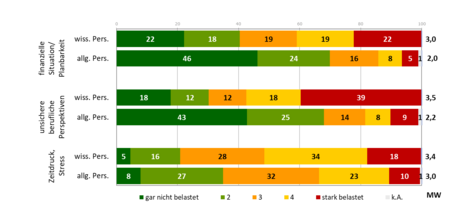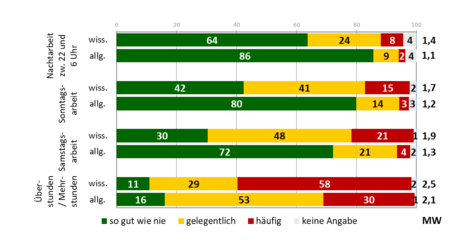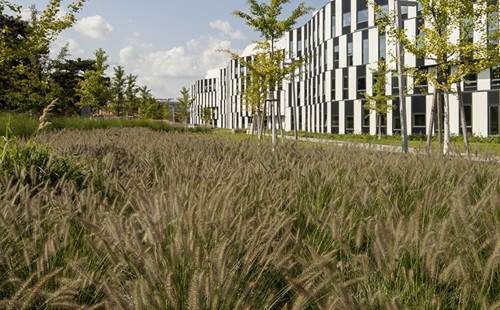Working conditions in the higher education sector
In 2018, the Arbeiterkammer Wien (Vienna Chamber of Labour, short AK) commissioned a research association of IFES and the NPO Competence Center to conduct a study on the work situation of employees in higher education.
The aim of the research project was to provide a deeper insight into the specific work-related problems as a basis for the AK's future interest policy priorities. A written questionnaire was sent to all AK members employed at Viennese universities of applied sciences and universities. This concerns about 15,000 persons. A total of 2,535 employees took part in the survey, with the majority of the respondents (91%) working at universities and 9% at universities of applied sciences. 64% of the respondents at the universities can be assigned to research and teaching, the remaining 40% (with dual use) to general, mainly administrative activities. First results of this study are now available, more detailed information will follow.
In summary, it can be seen that there are significant differences between the better protected employees among the so-called general staff and the often precarious employees in the research sector. Young researchers at universities are subject to particularly high workloads. In addition to the high demands on working hours, which often go far beyond the agreed level, it is in particular the insecure professional position and the lack of prospects with all - not only material - accompanying symptoms that massively affect the work situation of this group.
The following figures show the difference and the problems mentioned quite clearly. For example, almost 40% of the employees in the scientific sector state that they feel strongly burdened by uncertain career prospects.

Key to graphic:
Nachtarbeit zw. 22 und 6 Uhr - night work between 10pm and 6am; Sonntagsarbeit - working on Sundays; Samstagsarbeit - working on Saturdays; Überstunden - working overtime; wiss. - scientific staff; allg. - general, administrative staff; so gut wie nie - hardly every; gelegentlich - sometimes; häufig- often; keine Angabe - no answer; MW - median
Due to a high proportion of part-time work, the average agreed working time at the universities is only 31.8 hours per week. In reality, however, the agreed working hours are sometimes considerably exceeded, particularly in the research sector. About half of the researchers (university: 58%, university of applied sciences: 49%) each frequently work overtime, and about one third each at least occasionally, with more than one third of the respondents also working on weekends in some cases. However, general personnel are also affected by considerable overtime.

Key to graphic:
finanzielle Situation - financial situation, planning possible; unsichere berufliche Perspektiven - unsecure career perspectives; Zeitdruck, Stress - time pressure, stress
An interesting finding is also the comparatively high level of dissatisfaction with the management style of those surveyed by their superiors. This affects both groups more or less equally.
Interested participants and works councils are now informed of the main findings in various forums. After the AK elections in April 2019, the AK plans to devote more time to universities. In view of the multiplier function of employees in the university sector, through their contact with students, this is probably also in the interest of the image of an inter-company representation of employees' interests.
